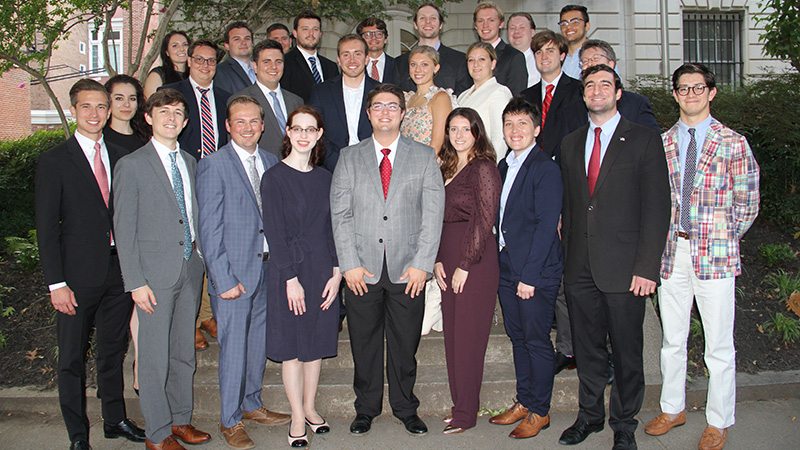
The goal of TFAS Summer Law Fellowship aims to foster a new generation of attorneys that are well-versed in the principles of originalism, limited government and free enterprise so as to defend the values and ideals of a free society.
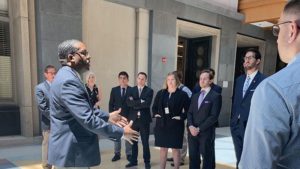
TFAS Summer Law Fellows will take two courses for one credit each on Constitutional Originalism and Law & Economics at the Antonin Scalia Law School at George Mason University.
Taught by Judge Greggory Maggs of the U.S. Court of Appeals for the Armed Forces, the originalism course explores the theory and practice of originalism as a method of constitutional interpretation. An accompanying course on Law & Economics, Professors Donald Kochan and James Cooper of Scalia Law, will explore the economic concepts that underpin foundational legal principles to advance the rule of law and the free market system. Students will develop a deeper appreciation for the economic and constitutional principles that provide the basis for a system of limited government and free enterprise.
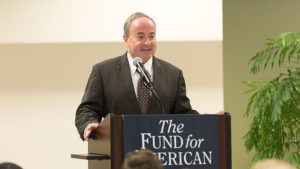
Class sessions are held at the Scalia Law campus conveniently located just across the Potomac River in Arlington, Virginia, and easily accessible on the Silver and Orange Line Metro trains. Founded in 1972 as the International School of Law in Washington, D.C., it merged with GMU in 1979 to become George Mason University School of Law. In 2016, it was renamed the Antonin Scalia Law School in memory of the late Supreme Court Justice. Scalia Law is home to an exceptional market-oriented faculty, placing them at the center of foundational debates on liberty, private property rights, constitutionally limited government and the economic analysis of law. Scalia Law also hosts research projects and programs through the Law and Economics Center and the Center for the Protection of Intellectual Property.
Fellows will earn two credit hours awarded through Scalia Law upon successful completion of the coursework.
The class we took on originalism was especially important to me since I was introduced to ideas that I am unlikely to be taught at my law school. There are a variety of approaches, even within circles advocating judicial restraint, and I found myself often disagreeing with my colleagues – to all our benefit.”
– Jacob Altik, Law ’19
University of Michigan Law School
Intern, New Civil Liberties Alliance
Course Description
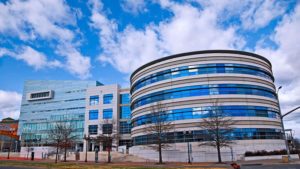
Constitutional Interpretation: The Debate over Originalism (1 Credit)
The course will explore the principles of originalism as a method of constitutional interpretation beginning with the American Founders to the present day. Students will be exposed to the history, origins and competing theories of originalism and its practical application in landmark cases before the Supreme Court. Click here for the 2024 syllabus.
An Overview of Law & Economics (1 Credit)
The course will provide a survey of foundational economic principles and the economic way of thinking from which to examine the economic concepts that underpin key areas of property law, anti-trust law, constitutional law and administrative law. Students will receive a basic grounding in fundamental economic principles and their relationship to core practices of law. Click here to view the 2024 syllabus.
The course on originalism deepened my understanding of and appreciation for the Constitution and made me both a better law student and a better citizen.”
– Christian Townsend, Law ’19
Indiana University Maurer School of Law
Intern, Cato Institute
Faculty
Judge Gregory E. Maggs
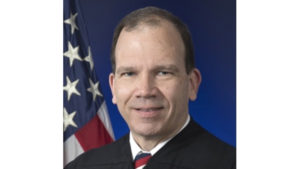
Gregory E. Maggs was appointed a judge on the U.S. Court of Appeals for the Armed Forces on February 1, 2018.
He was a member of the full-time faculty of the George Washington University Law School faculty from 1993 until his judicial appointment in 2018. He served as the Interim Dean of the law school from 2010-2011 and from 2013-2014, as the Senior Associate Dean for Academic Affairs from 2008-2010, as the co-director of the law school’s National Security and U.S. Foreign Relations LLM program from 2010-2018. By vote of the graduating class, he received the law school’s Distinguished Faculty Service Award in 1997, 1998, 2004, 2005, 2011, 2012, 2013, 2014 and 2015. In 2012, the university gave him the George Washington Award for outstanding service. He was named the Arthur Selwyn Miller Research Professor of Law in 2017.
Judge Maggs is a graduate of Harvard College and Harvard Law School. He was a law clerk for Justices Clarence Thomas (1991-1992) and Anthony M. Kennedy (1989-1990) of the U.S. Supreme Court and for the late Judge Joseph T. Sneed of the U.S. Court of Appeals for the Ninth Circuit (1988-1989). He also taught for two years as an assistant professor at the University of Texas School of Law. His other experience includes service as a special master for the U.S. Supreme Court, a consultant to Independent Counsel Kenneth Starr in the Whitewater Investigation, and an assistant to the late Hon. Robert H. Bork in private practice and research. He is a member of the American Law Institute and was formerly a member of the Advisory Board for the Heritage Foundation’s Center for Legal and Judicial Studies.
Judge Maggs served in the U.S. Army Reserve, Judge Advocate General’s Corps, from 1990 until 2018. He retired in the rank of Colonel upon his appointment to the Court of Appeals for the Armed Forces. He was assigned as a trial or appellate military judge from 2007 until 2017. He is a graduate of the U.S. Army War College, the Joint and Combined Warfighting School, the Military Judge Course, the Command and General Staff Course, the Judge Advocate Officer Advanced and Basic Courses, the Air Assault School, and the Infantry Weapons Specialist Course. He was called to active duty in 2007-2008. In 2002, he received the Judge Advocates Association’s Outstanding Career Armed Services Attorney Award.
At George Washington, Judge Maggs has taught constitutional law, contracts, commercial paper, counterterrorism law, the law of software contracts, comparative contract law, secured transactions, and other subjects. He has written several books and many articles on these subjects.
James C. Cooper
Professor of Law; Director, Program on Economics & Privacy
Antonin Scalia Law School
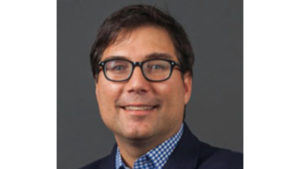
James C. Cooper brings over a decade of public and private sector experience to his research and teaching. Prior to joining the faculty at Scalia Law, he served as deputy and acting director of the Federal Trade Commission’s Office of Policy Planning, advisor to Federal Trade Commissioner William Kovacic, and as an associate in the antitrust group of Crowell & Moring, LLP. Professor Cooper returned to the FTC in 2018-19 to serve as a deputy director in the FTC’s Bureau of Consumer Protection. His research focuses on the law and economics of privacy, data security and consumer protection, as well as on a wide variety of topics surrounding competition policy. It regularly appears in top academic journals, such as the Journal of Law & Economics, International Review of Law & Economics, Journal of Regulatory Economics, Antitrust Law Journal, and the Virginia Journal of Law & Technology. Professor Cooper has a Bachelor of Arts from the University of South Carolina, a Ph.D. in economics from Emory University, and his law degree, magna cum laude, from the Antonin Scalia Law School at George Mason University, where he was a Levy Fellow and a member of the George Mason Law Review.
Donald J. Kochan
Professor of Law; Executive Director, Law & Economics Center
Antonin Scalia Law School
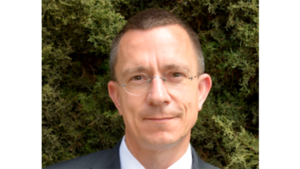
Donald Kochan is Professor of Law and Executive Director of the Law & Economics Center (LEC). Professor Kochan is an elected member of the American Law Institute (ALI) and serves as an Adviser to ALI’s Restatement of the Law Fourth, Property project. Professor Kochan is a Nonresident Scholar at the Center for the Constitution at Georgetown University Law Center, where he was a Visiting Scholar in residence during Fall 2018. Before joining the Antonin Scalia Law School faculty, he was the Parker S. Kennedy Professor in Law at Chapman University’s Dale E. Fowler School of Law from 2004 to 2020. From 2003 to 2004, Professor Kochan was an Olin Fellow at the University of Virginia School of Law. During 2002-2003, he was a Visiting Assistant Professor of Law at George Mason’s Scalia Law School.
Professor Kochan’s scholarship focuses on areas of property law, constitutional law, administrative law, local government law, natural resources and environmental law, and law & economics. He has published several books and more than 50 scholarly articles and essays in well-regarded law journals. His work has been cited in more than a dozen state and federal court opinions, in more than 75 briefs filed in state and federal courts including more than 25 filed in the U.S. Supreme Court, in dozens of books and treatises, and in more than 800 scholarly articles.
Professor Kochan received his JD from Cornell Law School, where he was a John M. Olin Scholar in Law and Economics and managing editor of the Cornell International Law Journal. During law school, he also served as editor and executive editor of the Harvard Journal of Law & Public Policy symposium issues in 1997 and 1998. He received his BA from Western Michigan University, magna cum laude, with majors in both political science and philosophy, where he studied as the John W. Gill Medallion Scholar and was honored as the Presidential Scholar (awarded to the top graduate in the political science department).
After graduating from law school, Professor Kochan was a law clerk to The Honorable Richard F. Suhrheinrich of the United States Court of Appeals for the Sixth Circuit. Following his clerkship, Professor Kochan was an associate with the firm of Crowell & Moring LLP in Washington, D.C., where he specialized in natural resources & environmental law as well as tort, products, and consumer civil litigation & legislative affairs.
Lecture Series
TFAS Summer Law Fellows will participate in a weekly lecture series with leading scholars, judges and attorneys on salient issues in law and policy, and the principles of limited government and free enterprise. The lectures are designed to complement the coursework on originalism and law & economics and provide an opportunity to network with leading public policy experts and legal minds in the law and liberty movement.
Recent guest lecturers have included:
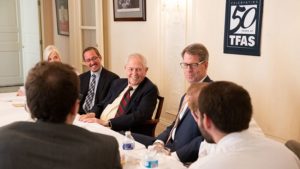
- Former Attorneys General Edwin Meese and Michael Mukasey
- Honorable Mike Pence, 48th Vice President of the United States
- Judge James L. Buckley, American Jurist, Politician, Civil Servant, Attorney, Businessman, and Author
- Honorable Paul Clement, 43rd U.S. Solicitor General
- Honorable Eugene Scalia, 28th U.S. Secretary of Labor
- Hester Peirce, Commissioner, U.S. Securities & Exchange Commission
- Allen Dickerson, Commissioner and Vice Chair, Federal Election Commission
- Brian Rabbitt, former Acting Assistant Attorney General for DOJ’s Criminal Division
- Michael Huston, Assistant to the Solicitor General, DOJ
- Ilya Shapiro, Director of Constitutional Studies, Manhattan Institute
- Randy Barnett, Patrick Hotung Professor of Constitutional Law, Georgetown University Law Center
- Adam Liptak, Supreme Court correspondent, The New York Times
- Todd Gaziano, President, Center for Individual Rights
- Yuval Levin, Senior Fellow, American Enterprise Institute
- Tom Jipping, Senior Legal Fellow, Edwin Meese III Center for Legal and Judicial Studies, Heritage Foundation
- Prof. Hadley Arkes, Founder, James Wilson Institute
- Bradley Smith, Institute for Free Speech and former FEC Chairman
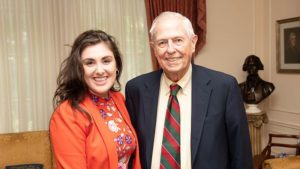
Glynis Gilio, Law ’19, poses for a photo with Judge James L. Buckley. - Former ACLU President, Nadine Strossen
- Prof. Stephen Vladeck, Lawfare founding member and Professor of Law, University of Texas School of Law
- Prof. Ilya Somin, Antonin Scalia Law School at George Mason University
- Lori Windham, Vice President and Senior Counsel, Becket
- Casey Mattox, Vice President for Legal and Judicial Strategy, Americans for Prosperity
- Gene Healy, Vice President, Cato Institute
- Diana Simpson, Attorney, Institute for Justice
- Clark Neily, Senior Vice President for Legal Studies, Cato Institute
- David French and Sarah Isgur, Advisory Opinions Podcast
- Prof. Josh Blackman, South Texas College of Law
- Prof. Anne Bradley, George and Sally Mayer Fellow for Economic Education, TFAS
- Darpana Sheth, Vice President of Litigation, Foundation for Individual Rights & Expression
Each week was filled with lectures and professional development sessions led by the nation’s top legal scholars. On frequent occasion I had to remind myself that I was sitting two seats away from men and women I have long looked up to for the past number of years.”
– Mark Metrey, Law ’19
University of Maryland School of Law
Intern, Hudson CookIn TFAS you get to interact and learn from an array of fantastic speakers that really teach you things you wouldn’t learn about normally in a law school. It’s really been a wonderful experience.”
– Nick Clifford, Law ’22
Indiana University Law School
Intern, The Pacific Legal Foundation
Thoughts from the Bench
TFAS aims to enhance the philosophical and practical understanding of law in the United States by exposing the Law Fellows to top legal minds. The “Thoughts from the Bench” discussion series features intimate conversations with some of the nation’s leading federal judges. Judges share practical advice on judicial clerkships, tips for career advancement, and instructive and sage insights on originalist jurisprudence. Past participants include:
- Judge Douglas Ginsburg, U.S. Court of Appeals, D.C. Circuit
- Judge Trevor McFadden, U.S. District Court for the District of Columbia
- Judge Neomi Rao, U.S. Court of Appeals, D.C. Circuit
- Judge Jennifer Elrod, U.S. Court of Appeals, 5th Circuit
- Judge Andrew Oldham, U.S. Court of Appeals, 5th Circuit
- Judge Don Willett, U.S. Court of Appeals, 5th Circuit
- Judge Ryan Nelson: U.S. Court of Appeals 9th Circuit
- Judge Amul Thapar, U.S. Court of Appeals, 6th Circuit
- Judge Chad Readler, U.S. Court of Appeals, 6th Circuit
- Judge Michael Brennan, U.S. Court of Appeals, 7th Circuit
- Judge Lisa Branch, U.S. Court of Appeals, 11th Circuit
- Judge Ryan Holte, U.S. Court of Federal Claims
- Judge Gregory Maggs, U.S. Court of Appeals for the Armed Forces

